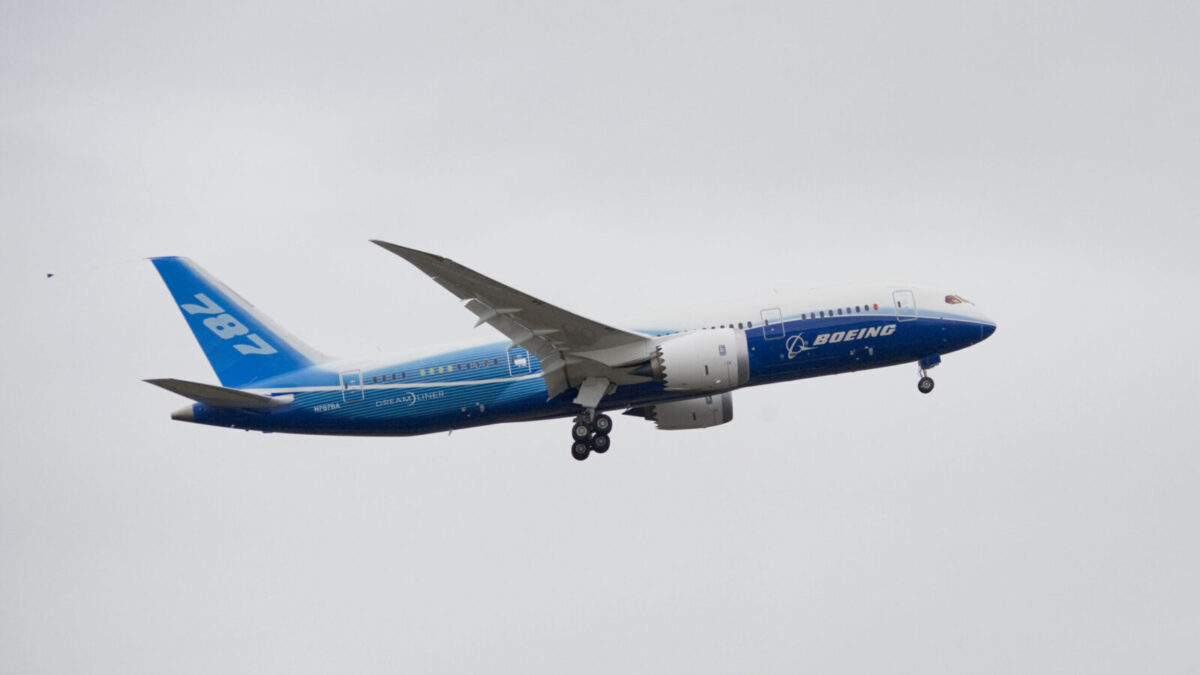Stay Up to Date
Submit your email address to receive the latest industry and Aerospace America news.
The first 787 Dreamliner during its inaugural flight in 2009. Credit: Boeing
PARIS — There was a notable fixture missing from last week’s Paris Air Show: announcements from Boeing. Such events are typically an opportunity for the company and its European rival, Airbus, to finalize outstanding deals and announce multimillion-dollar aircraft orders. Instead, executives from the U.S. behemoth were somber and subdued, following the June 12 crash of Air India Flight 171.
The company told me it chose not to announce orders at the show, as a gesture of respect toward those affected by the crash of the Boeing 787 Dreamliner, which plummeted to the ground shortly after taking off from Ahmedabad, killing all but one of the 272 aboard and at least 30 on the ground. Boeing also opted to cancel several planned engagements.
“Our focus is on supporting our customers, rather than announcing orders at this airshow,” a spokeswoman told me by email.
At the front of the company’s chalet was an arrangement of red and white flowers and a framed white sign that read, “Honoring all those affected by Air India Flight 171.” In contrast, the Airbus chalet just a few doors down was buzzing with customers and clients — though employees told me that the tragedy had also affected their sales announcements. Airbus expressed condolences for the victims at the start of its order announcements, and the usual celebratory mood of its press events was missing.
The crash altered what was meant to be a triumphant week for Boeing. The company had planned to announce triple-digit orders, according to an employee who was granted anonymity to speak candidly. Additionally, executives were to tout CEO Kelly Ortberg’s progress in mitigating the manufacturing and quality issues that have plagued the company for years.
India’s Aircraft Accident Investigation Bureau has not yet released its preliminary findings about the probable cause of the crash, the first one involving a Dreamliner since its introduction in 2011. Recent incidents involving Boeing aircraft have centered on the 737 MAX, including last year’s door plug blowout and the 2018 and 2019 crashes that killed 346 and prompted regulators worldwide to ground the design for 20 months.
Due to this history, Boeing is conscious of the need to reassure customers and the flying public, Darren Hulst, the company’s vice president of commercial marketing, told journalists during a briefing at the show. He added that the flying public should still be confident in Boeing aircraft.
“The relationships, the transparency and focus we’ve had in working with our customers and demonstrating and improving that credibility over time, that was not just something that we did overnight,” he said. “It’s a function of the long-term values that we’ve had for safety and quality, and just re-instilling that through our business and also being more open in terms of our communication, and that will continue through all of this.”
The crash is unlikely to affect Boeing’s reputation in the long run, said industry analyst Richard Aboulafia, particularly if the investigation concludes that it was not due to the aircraft’s design. He added that at this early stage, no one should assume an issue with the aircraft itself was the cause.
There are “dozens of other possibilities: pilot error, maintenance error, malicious action,” he said.
We may have an answer soon. The Aircraft Accident Investigation Bureau must release its preliminary report within 30 days of the crash, though the full report could take up to a year. In the meantime, Air India has introduced extra inspections on its 787 and 777 fleet, and said Wednesday that it would cut its international routes by 15% in the coming weeks to accommodate the enhanced checks, as well as the impact of airspace closures in the Middle East.
For now, Boeing faces the difficult task of reassuring passengers. One executive I spoke to at the show said his wife had begged him to reschedule his flight to Paris aboard a Dreamliner.
He still took the flight, but he said he had to check in with her as soon as he landed.
About Charlotte Ryan
A London-based freelance journalist, Charlotte previously covered the aerospace industry for Bloomberg News.
Related Posts
Stay Up to Date
Submit your email address to receive the latest industry and Aerospace America news.




